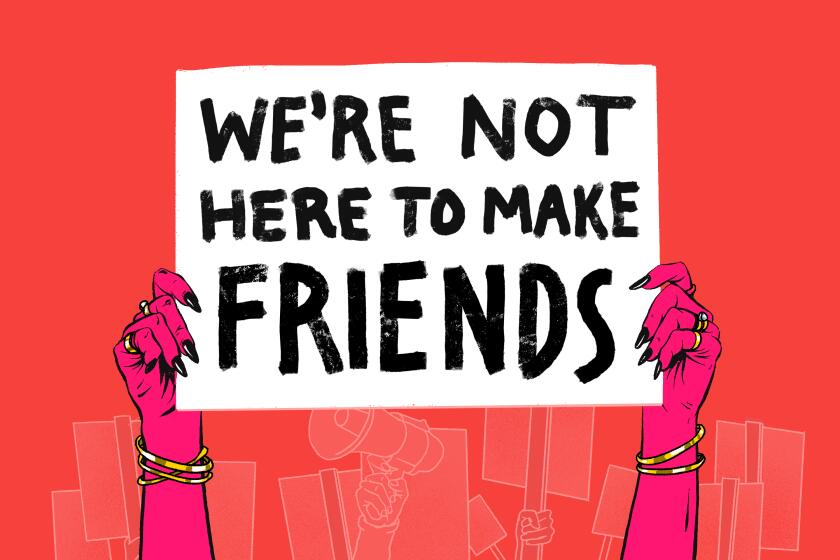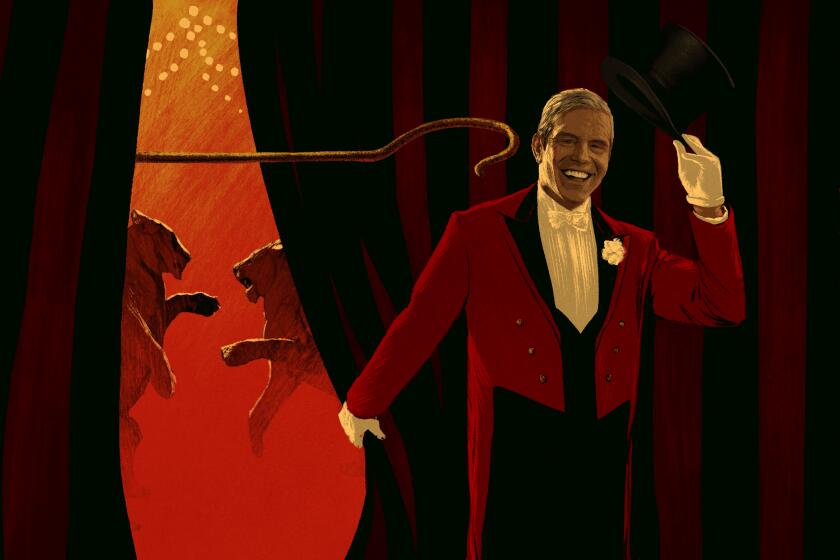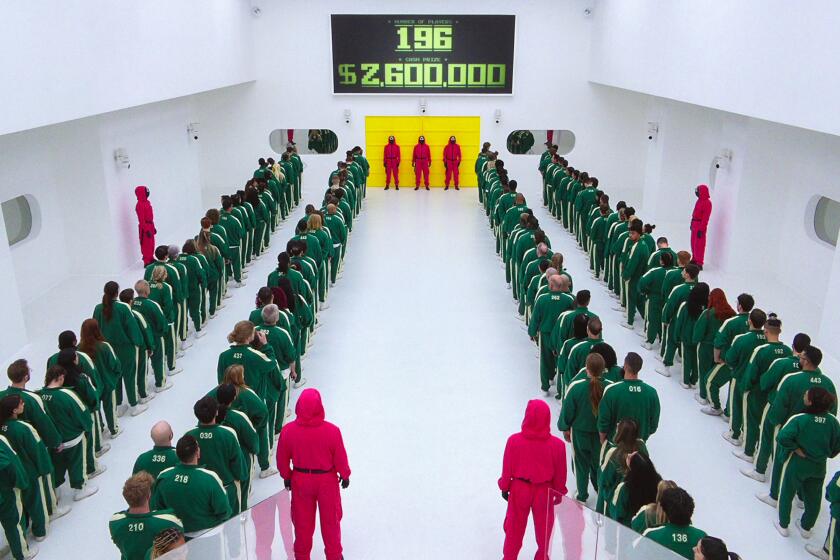‘The Contestant’ tells the bizarre story of a Japanese man who lived a real-life ‘Truman Show’

- Share via
New York — In January 1998, an aspiring Japanese comedian named Tomoaki Hamatsu but better known as Nasubi — or “eggplant,” because of his long face — was chosen to star in “Susunu! Denpa Shōnen,” a hit variety show.
The brainchild of producer Toshio Tsuchiya, “Denpa Shōnen” featured young people competing in extreme challenges — think “Saturday Night Live” meets “Jackass.” Nasubi was selected to take part in a segment called “A Life in Prizes,” which was inspired by the magazine sweepstakes that were all the rage in Japan in the ’90s.
But what should have been a triumphant breakthrough for the 22-year-old from Fukushima instead unfolded into one of the most bizarre and disturbing sagas in TV history — and is now the subject of a documentary, “The Contestant,” directed by Clair Titley and premiering Thursday on Hulu.
Instead of being whisked off on a foreign adventure like other “Denpa Shōnen” contestants, Nasubi was taken to a tiny apartment furnished with a small table, a rack of magazines and a stack of blank postcards. There, he was forced to remove his clothes, and he used a strategically placed pillow to preserve his modesty on camera.
As scrutiny mounts on reality TV, stars from Bravo’s ‘Real Housewives’ franchises, ‘Love Is Blind’ and ‘The Challenge’ say the industry needs to change.
According to the rules of the challenge, devised by Tsuchiya, Nasubi could sustain himself only with prizes from magazine sweepstakes, which he entered by filling out thousands of postcards. Once he’d earned prizes worth a million yen — or about $8,000 — he would be free. Until then, Nasubi would be alone, with no human contact except for an occasional check-in from Tsuchiya.
To everyone’s surprise, Nasubi endured the challenge for more than a year, surviving on half-cooked rice and dog food but suffering emotionally as Tsuchiya concocted brutal new twists in what amounted to a televised psychological experiment. The feat turned Nasubi into one of the biggest stars on Japanese TV — but he had no clue.
Although Nasubi knew he was being filmed, he was told that the footage would air at a later date, and most of it would not be used. In reality, his grueling experience was being broadcast in weekly segments on “Denpa Shōnen,” complete with wacky graphics (including an eggplant emoji over his groin) and cartoonish sound effects. Thanks to then-cutting-edge technology, viewers could even access a 24-7 livestream online.
Much like the title character in “The Truman Show” — released in June 1998 — Nasubi was entirely oblivious to his own fame until the ordeal was over.
Using extensive footage from “Denpa Shōnen” as well as interviews with Nasubi, his family and Tsuchiya, “The Contestant” is an unsettling look at one man’s unwitting brush with fame — and the surprising second act he pursued decades after becoming a national sensation.
Titley was working on another project several years ago when she found herself down an internet rabbit hole reading about Nasubi.
“I kept finding articles, but the majority of them were quite simplistic about his story and almost derogatory in the way they depicted Japanese culture — a bit, you know, ‘Look at how crazy they are,’” said the director, who recently sat for a joint interview with Nasubi. “Nobody really seemed to investigate Nasubi’s story.”
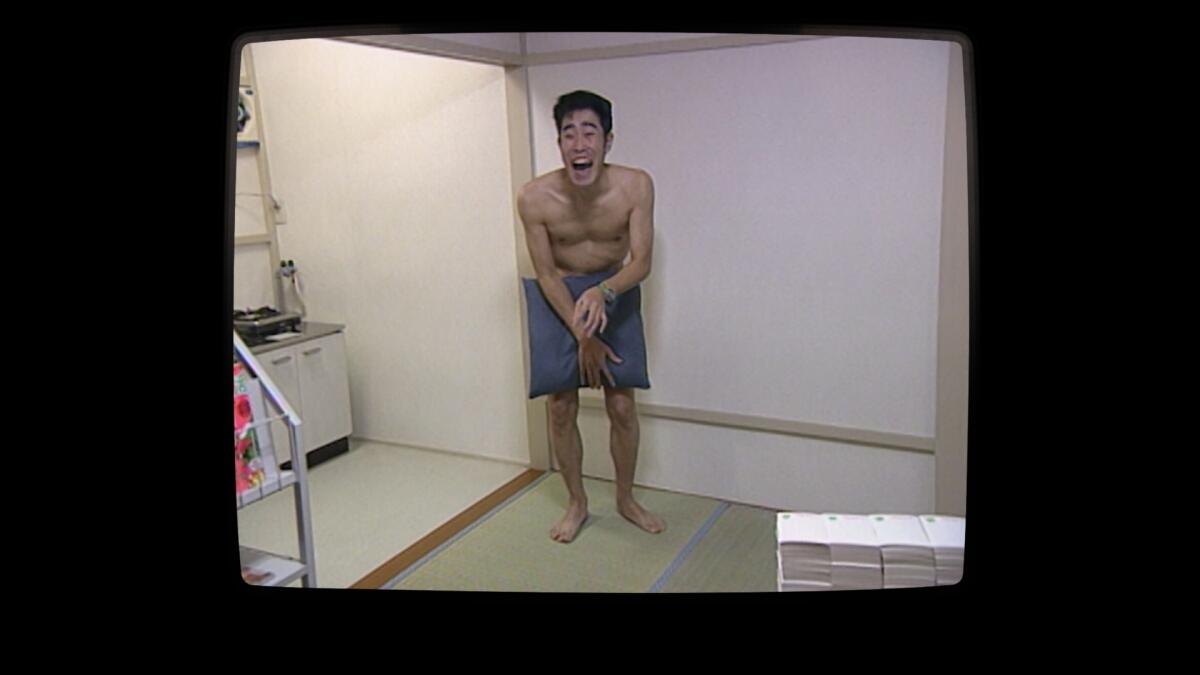
With help from a neighbor who was a Japanese translator, Titley began corresponding with Nasubi. After some back and forth, he flew to the U.K. in 2018 to discuss a potential collaboration with her. “We went on this little road trip ’round the U.K., and with the interpreter, just chatted about his story and played a lot of table tennis,” said Titley.
“We had a really amazing time,” said Nasubi, speaking through an interpreter. “I decided that this is somebody I can trust with all my heart.”
Titley and Nasubi spoke with The Times about making “The Contestant,” revisiting this surreal episode in his life and audience reactions to the film. This conversation has been edited and condensed, and it includes mild spoilers.
[To Titley] What interested you in the subject?
Titley: Like everybody else, I was thinking, “How on Earth could this happen? Is this real? Why didn’t he leave?” All those standard questions, but then also, how has this affected him and what sort of person had he become as a result of this experience? Everything [written about Nasubi] seemed to stop the moment he left “Denpa Shōnen” and hadn’t really investigated what happened after.
[To Nasubi] Were you reluctant to revisit this? Why was Clair [Titley] the person to tell this story?
Nasubi: I got a lot of attention from overseas media — radio, TV, magazines. They want to interview me. But a documentary film? I felt like that was a special offer. I didn’t know anything about Clair. She contacted me through Facebook. Some people said, “How could you just trust this person?” But she said she found a Japanese interpreter, and they were very sincere. I decided to be open. Maybe I was deceived during “Denpa Shōnen,” but my policy is that it’s better to be deceived than to deceive other people.
Bravo and the producers of shows such as “Real Housewives” face a slew of allegations and lawsuits claiming bullying, harassment and unfair labor practices.
How were you able to get Tsuchiya to participate?
Titley: We approached him via Nasubi. He wasn’t reluctant. I have a lot of respect and gratitude for the way he took part in the [film], because there were no caveats. He didn’t insist on anything. He was very open, honest and really quite brave. He’s a filmmaker himself. He’s not daft. He knows how he will be interpreted in the West. My belief is that maybe he took part as a kind of apology to Nasubi.
I didn’t feel that I needed to tell the audience that what he did was questionable or immoral. I didn’t feel like I needed to spell that out to anybody. If anything, I thought it was more interesting if we allowed him the room and the space — not to justify himself, but to explain himself.
[To Nasubi] Had you actually watched any of the footage before making this documentary?
Nasubi: I tried so many times to watch it but emotionally it was very difficult. I just couldn’t do it. It might be fine for people to watch, but I felt humiliated watching myself in that situation.
In Screen Gab No. 108, we break down what ‘The Challenge’ shares (and doesn’t) with the original ‘Squid Game,’ and offer some food-themed recommendations heading into Thanksgiving.
Did that feeling of humiliation ever go away?
Nasubi: Little by little, my consciousness was changing. When I tried to work as an actor or comedian, there were lots of offers, but they would say, “Are you interested in being naked?” Or even without [me] being naked, they wanted to re-create something that I went through, so it was just like going back to the same thing. I feel like I had a big cross on my back, so heavy I couldn’t really stand up straight.
The big change came in 2011, when the earthquake happened in Japan. I’m from Fukushima. I had to go and do some rescue work, and I met all these people who were so happy to see me. They often told me, “I got so much encouragement from you by watching the show. Having you here empowered us.” I realized that I could make my struggle into something positive and help people and bring smiles to the people. I cannot change the past, but I might be able to change the future.
What do you think made you able to last so long in “A Life in Prizes”?
Nasubi: I myself thought it wasn’t going to last. How could anybody live just on contest prizes for such a long time? I thought the maximum would be one or two months. It was very difficult mentally. You start to think it’s safer to stay in the same environment than changing the environment. I was trapped physically and mentally as a result. I also wanted to have mental fortitude, just because this is something that I decided I would participate in, so I did not want to quit. I wanted to go through until the end. Physically it was hard, but that’s something you can really get over. Your body will get used to it. The solitude, the loneliness — that’s the hardest part.
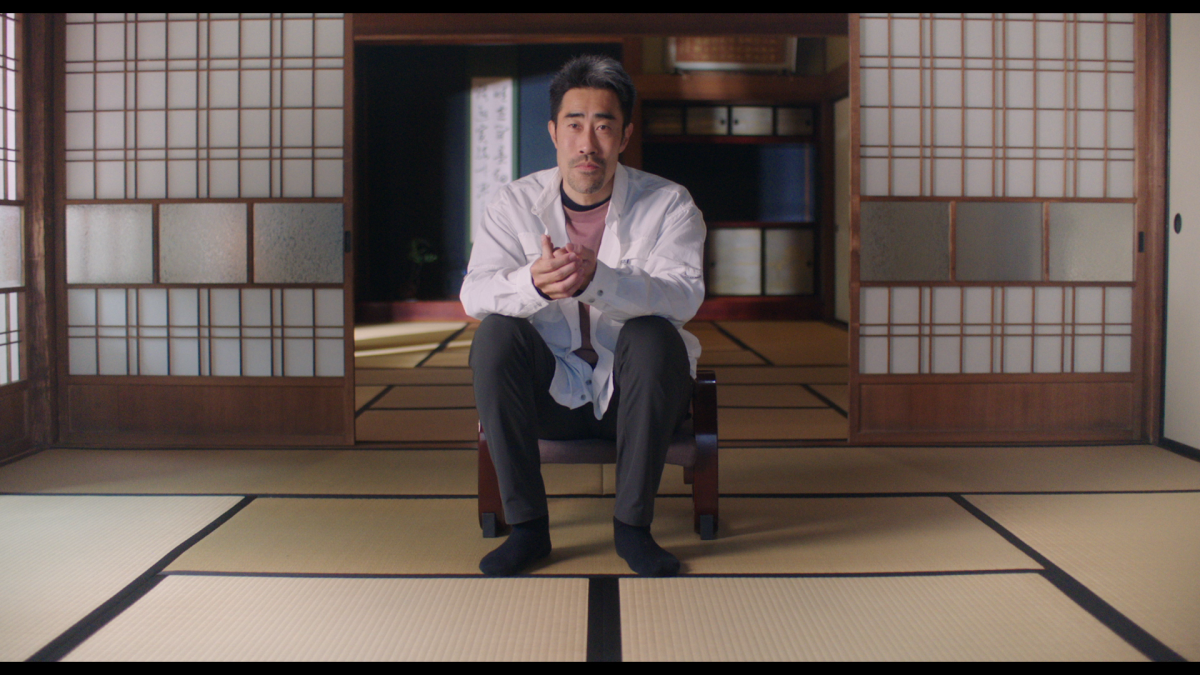
What was the low point for you?
Nasubi: When I completed [the challenge] in Japan, but then I was taken to Korea and I had to start again. That was my low point. That was so hard. I didn’t think anything that hard would ever happen to me in my life. When Tsuchiya was telling me to stay in Korea, he said that all the anger came out, like every cell — he actually saw it coming up from my body. I was mad.
That is probably the hardest scene to watch in the film. What kind of reactions have you seen from audiences?
Titley: In terms of audience reaction, what I’ve really loved about it is that people have come out of it angry at how Nasubi’s been treated, but not depressed, they’re positive, which I think is what we wanted to do. People feel moved and inspired by Nasubi.
They’ve picked up on so many different themes as well. You make a film and you’ve got this clear idea about what it’s about. Then when you share the film, suddenly it becomes everybody else’s as well. I had people in the first few festivals who said, “It’s great that you’ve made this film all about coercive control, and it’s so important for the domestic violence community.” It was great that it spoke to them.
For me, it’s very much a film about a man looking for connection, perhaps in the wrong places to start with, and then he finds it in unusual places.
Maybe because I’m American, I watched this and wondered if anyone ever thought about suing or taking legal action.
Titley: Japanese society is much less litigious than the U.K. and the U.S. The other thing is that back then, there was no precedent. Now we’ve got 20 years of reality TV history behind us. If you went on a reality TV show [today], you know you might be manipulated. But back then, even the people making the shows didn’t really know what they were doing. They were making it up as they went along.
Nasubi: I didn’t know the word “sue.” Speaking with the Western press, now I’ve learned the word “sue.” People often come up and say, “This is a violation of human rights and you should sue.”
But [back in 1998], Tsuchiya was very popular. Once you were on his program, you were guaranteed fame. [“Denpa Shōnen”] was a show that everybody, aspiring actors and comedians, really wished to be a part of.
Instead of hurting other people by suing them, just to gain some money for myself, I decided to accept my past. I was more into acceptance of my life. I feel like I can use that hatred and anger — that negative energy — and make it into positive energy within myself.
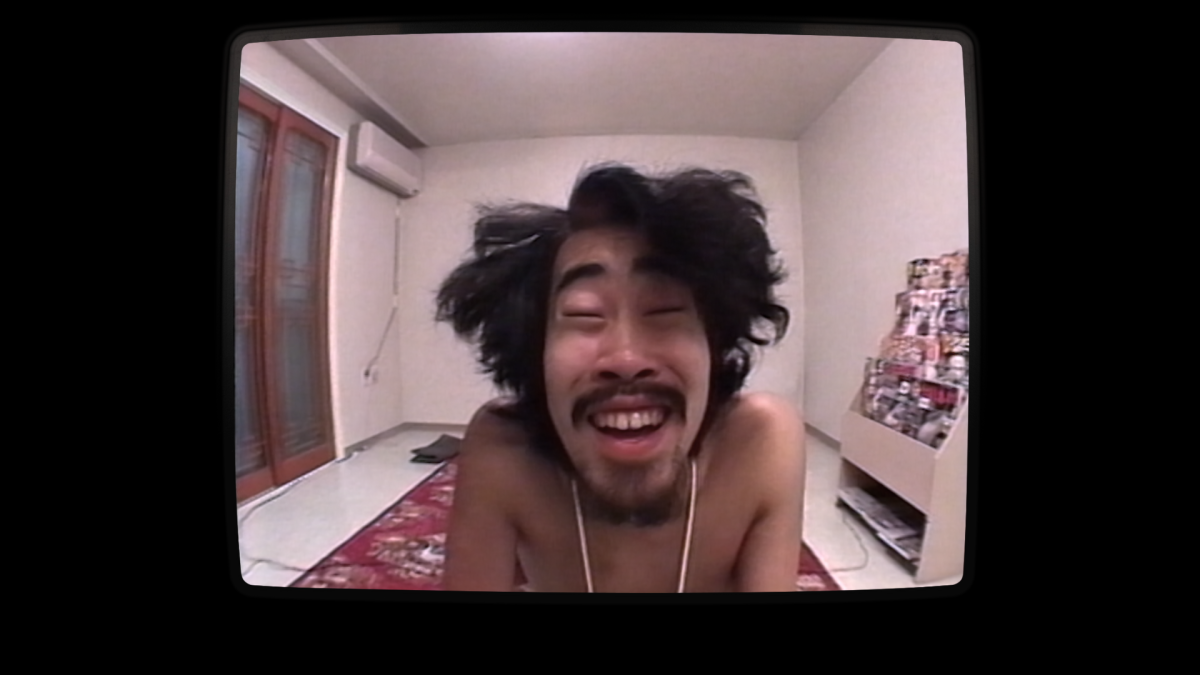
Are there ways that this affected you and still affect you now, either physically or mentally?
Nasubi: I don’t want to write postcards anymore. I’ve done enough for a lifetime. I can still eat kimchi [which he survived on when he was moved to Korea], but I’m not thrilled about it. In the beginning, it was hard for me to wear clothes. My skin changed physically. When [the challenge] finished, and I was in the TV studio, [“Denpa Shōnen’ host Akiko] Matsumoto touched my skin, she said, “It feels like elephant skin.” Because I wasn’t wearing clothes for such a long time, my skin became thicker, like clothing. If I wore clothes, then I would sweat.
What do you want people to know about you now?
Nasubi: I can relate to people in struggling situations — to vulnerable people. I’m not sure I can heal those people with this film, but maybe I can give them something. If I can use my past, my struggles in life, to help other people feel like It’s OK to go on, then I feel like my past was not wasted. It was something useful.
More to Read
The complete guide to home viewing
Get Screen Gab for everything about the TV shows and streaming movies everyone’s talking about.
You may occasionally receive promotional content from the Los Angeles Times.
